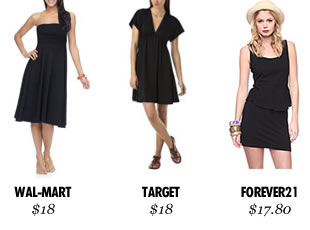Not Buying It: Wal-Mart Just Can’t Get People Into Their Clothes
Wal-Mart just reported increased quarterly profits and overall sales, led by low food prices. While that’s been enough to keep business growing, sales in other areas have suffered: apparel is one of particular concern for executives.
“We’re simply not converting enough of our grocery customers to shop apparel,†said William S. Simon, the president and chief executive of Wal-Mart’s United States division, in a conference call with investors.
After flirting with fashion-forward items, Wal-Mart decided to focus on basic clothes, but company executives said they did not perform well.
“It’s something that we’ve stumbled with over the last several quarters and we’re not happy with,†Charles M. Holley Jr., the chief financial officer, said in a conference call with reporters. “It does start with basics, and for us to be able to sell anything that’s fashionable at all, we really have to get basics down first.â€
While “we had a fairly good quarter†with items like T-shirts and underwear, he said, “where we’re still not executing is in the kids’ and the women’s business.†– {New York Times}
Children’s apparel is a different matter, but when it comes to women’s clothing part of the problem could be selection, but we’d put a larger part of the blame on Wal-Mart’s image.
In March, a number of bloggers picked up on PennyChic, a site by LA blogger Shauna Miller. Using herself and her friends as models, Miller post photos of outfits exclusively from Wal-Mart. In an interview with Refinery29 Miller says “Even my city-dwelling friends who hadn’t stepped foot in Wal-Mart before PennyChic go on Wal-Mart shopping binges online, because of the outfits they see on the site. I go to parties all the time and people are like ‘I’m Wal-Mart chic…look at my shirt!’ I’m exposing Wal-Mart to a new customer, which is very cool.”
Those commenting on the article weren’t as optimistic, referencing the company’s gender discrimination lawsuit and other ethical reasons for not thinking of going Wal-Mart chic.
There’s a marked difference in tone when Target or H&M releases a new designer collaboration or special collection. While Miller’s blog brought up questions over everything from labor practices to negative treatment of suppliers, you’d be hard pressed to find similar concerns on blog posts including fashion items from Target or H&M.
In this case, the difference isn’t exclusively about price – Target, Forever21 and Wal-Mart all currently offer a black dress for $18. It’s almost impossible to track an individual item back to the factory where it was made, but if we reason that the low prices are a result of less than ideal working conditions and pressure on suppliers, wouldn’t it be fair to assume that the conditions in the factories that produce clothing for Target or Forever21 are about the same as they are in the factories that produce Wal-Mart’s clothes?
Yet somehow those questions rarely – if ever – arise when the item being promoted is from any other low cost or fast fashion retailer. While Wal-Mart still doesn’t have the most compelling or cohesive style offering, their much larger challenge is convincing shoppers that their purchase is supporting a company with a culture that’s not any worse than any of the other’s who’ve kept cheap chic in style.


